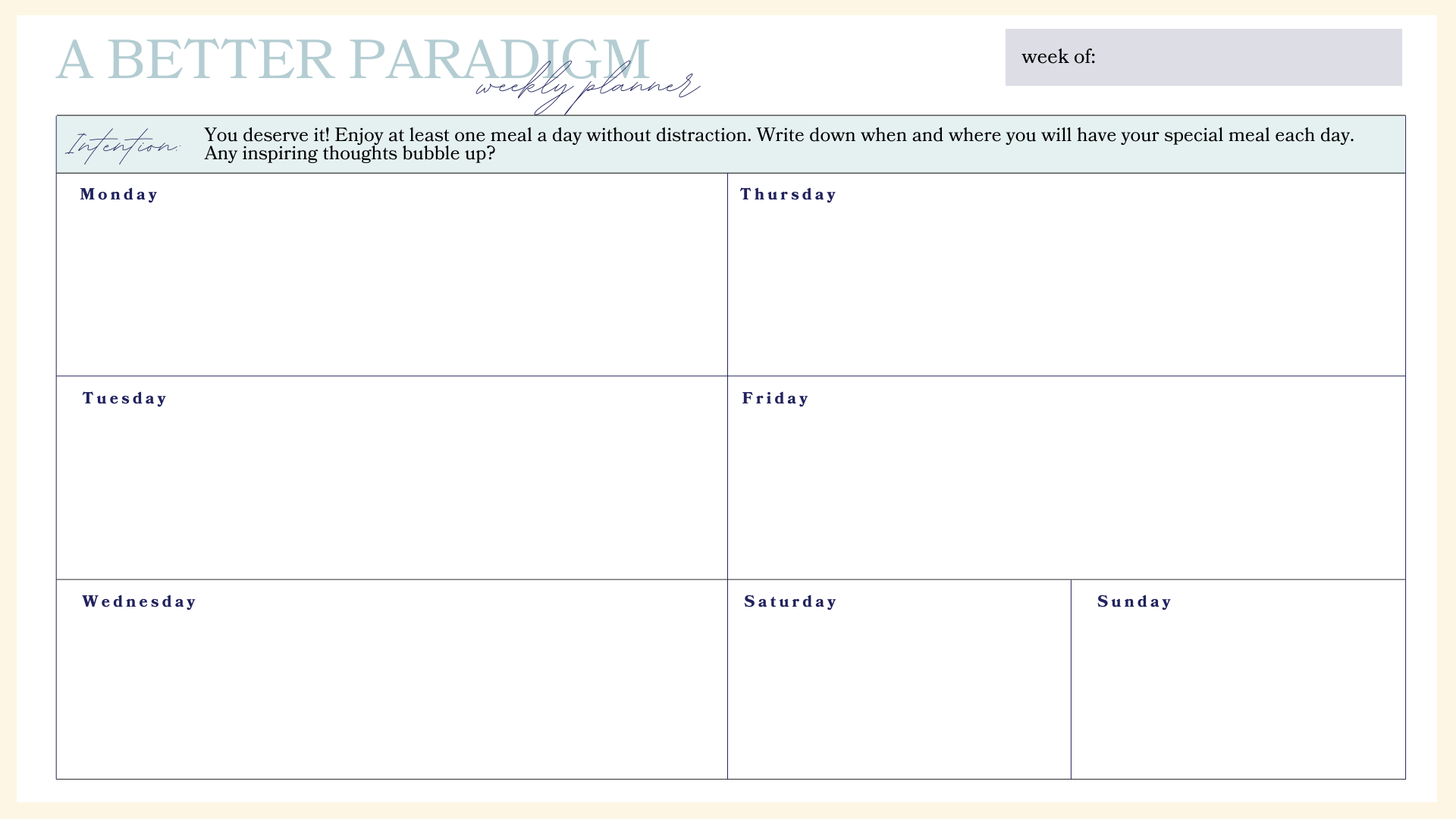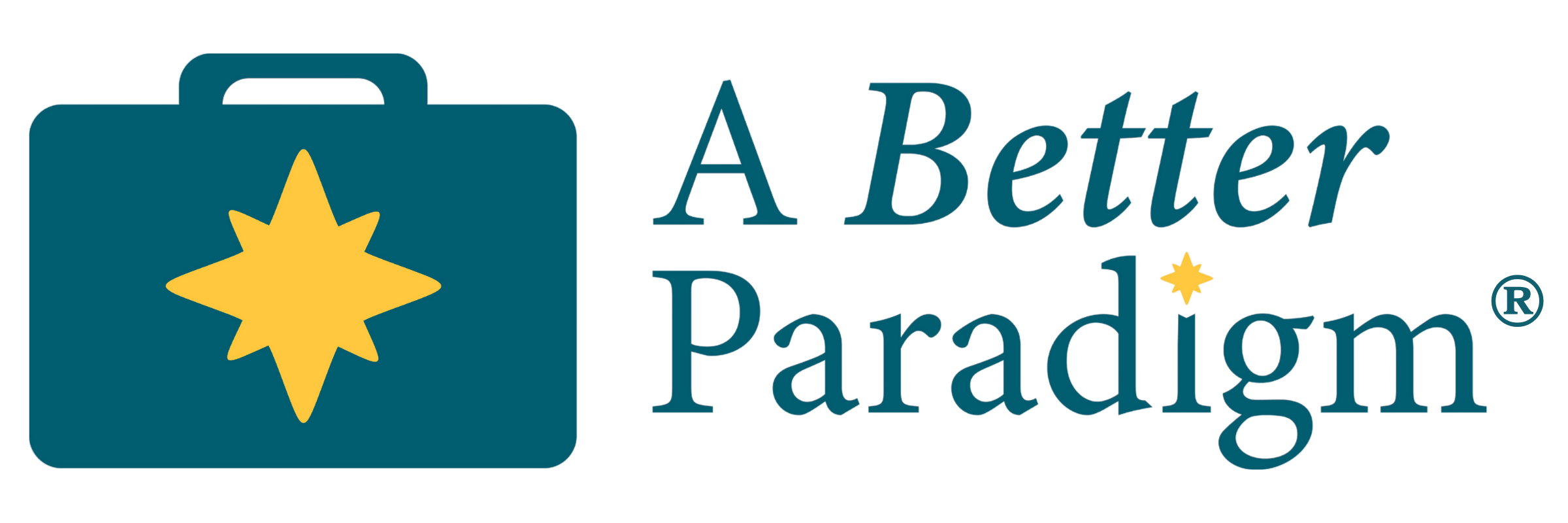
I wish those who are mandating 4-5 days a week Return to Office (RTO) would take a more people-focused and long-term view.
We’ve learned the benefits of Work From Home (WFH), and they outweigh the drawbacks, especially when hybrid options of 2-3 days come into play. WFH flexibility brings balance to lives, increases productivity, reduces stress, and helps boost employee and client retention, leading to bigger profits.
In these times when so many aspects of life are in upheaval, it behooves businesses that want to thrive to work with and on behalf of their employees.
As the human race reconsiders just about every aspect of our humanity, all at once, for all kinds of reasons, how do we live our best lives while navigating disruption?
We center ourselves. And we focus on what we can influence or change. We stay cognizant of the rest of it, but we don’t give it our energy. Our energy needs to go where it will do the most good.
And from the perspective of A Better Paradigm, that means focusing on being your best self at work and encouraging those around you to do the same. Want a simple framework for enacting that? Try The Four Agreements by Don Miguel Ruiz. Here’s the fast-forward for those of you who want the net/net:
- “Be impeccable with your word.”
- “Do not take anything personally.”
- “Do not make assumptions.”
- “Always do your best.”
It’s amazing how these four commitments to being your best self provide actionable guidelines for better lives inside and outside work.
🚀 Stories to Help You Drive Change
SPECIAL NOTE: If you hit a paywall, go to Google Search, enter the name of the publication and something about the story (author, title, subject) to get a link that may bypass the paywall. And hey, if you like the publication, consider subscribing!
- What does RTO done correctly look like? Emily McCrary-Ruiz-Esparza writing for Inc., offers tips including: planning (like, really planning), making the office inviting, leaning into your culture (assuming you’ve a positive one), and avoiding ultimatums.
- JP Morgan and Costco caught my attention last week by stating they’re keeping their DEI (diversity, equity, and inclusion) practices.
- And Lily Zheng, writing for The Harvard Business Review, asks “What Comes After DEI”? now that these initiatives are being removed from the federal government and at companies across the country. She offers ideas for how a new framework, built around fairness, access, inclusion, and representation, can succeed where she believes DEI has failed.
- The Wall Street Journal reports working from home has gotten “perkier” and that even when RTO mandates are in place, people with unique skills and talents still get to enjoy the WFH benefits others are denied.
- Cool concept: “care as activism.” Why small acts of kindness matter. (Scroll down, this is not the lead story.)
- The fewest Americans (44%) since Gallup started surveying them in 2001 say they are “very satisfied” with their personal lives. With lots of data to unpack, the article also highlights opportunities to turn things around as we work to understand each other better and truly connect.
✍️ Increase Workplace Kindness With Our Downloadable Planner
Here’s the prompt for Week 11 from A Better Paradigm’s compassionate workplace planner:

This week, we encourage you to purposefully enjoy one meal with no one else, just savor the meal and the experience that comes with solitude.
Download the full, free planner/reflector, and let us know what you think.
🖋 Noteworthy: The Center for Conscious Leadership
I recently chatted with Sharon Podobnik Peterson and was excited to learn about her company’s programs for cultivating more conscious teams. They do this by helping leaders and teams raise their levels of self-awareness. The Center offers programs/approaches. Here are two examples:
- Communities of Practice wherein they support leaders with putting ideas into practice in a cohort model. Participants learn about leadership strategies and theory work (such as feedback frameworks, nervous system regulations, etc.) and then spend time applying the learning, practicing, and problem-solving with a cohort of peers and assistance from a coach.
- Organizational Trauma Recovery wherein they work with a leadership team and their staff to identify where trauma and stress have institutionalized into the organization (urgency/command-control/etc.), identify how to transform the organization to be a compassionate, healing place that minimizes harm, prevents retraumatization, and re-orients towards connection.
To speak with someone about your team and how conscious team practices can help, visit The Center for Conscious Leadership.
🌟 Do Good Spotlight: Access Fund
The Access Fund supports nature and climbing. They are working for sustainable access to climbing areas across the nation while educating others how to advocate. If you’re all about natural-area preservation with vertical adventure as an added bonus, check out Access Fund.
🎉 Just for Fun
I’m planning a trip to Barcelona this spring. Anyone have any tips for “must do” activities while I’m there?
And speaking of travel, The Wall Street Journal’s 17th airline scorecard is here. It lists the best and worst airlines. Delta wins for “best” and Frontier brings up the rear. For the rest of the numbers, check out this article.
⏳Until Next Time…
Be conservative with your energy. Don’t waste it where it has no chance of doing good, but give it freely when you have the chance to be kind to someone—invested energy always finds its way back to you when you need it. 😊
Niki
